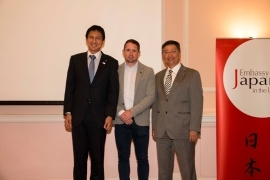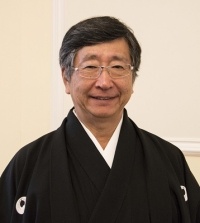Ambassador's Blog
 Green screen photo experience at Visit Japan Rugby World Cup (RWC) 2019 Night
Green screen photo experience at Visit Japan Rugby World Cup (RWC) 2019 Night
 With Parliamentary Vice-Minister for Foreign Affairs Shunsuke Takei and Former Welsh International Shane Williams
With Parliamentary Vice-Minister for Foreign Affairs Shunsuke Takei and Former Welsh International Shane Williams
Prime Minister Abe visits London
While life at the Embassy is seldom dull, there was a crescendo of activity at the end of April when Prime Minister and Mrs Abe visited London. As soon as they arrived at Heathrow following a visit to Moscow on the morning of the 28th, Mr Abe’s hectic schedule got under way in the form of a summit meeting with Prime Minister May at Chequers. The fact that Mr Abe was the first world leader to be hosted by Mrs May at that iconic location could be said to reflect the strength of the Japan-UK relationship. In fact, it was his second visit to Chequers following one he made last year. The two leaders reaffirmed the importance of the strategic partnership between Japan and the UK based on our countries’ shared commitment to the universal values. They agreed to continue their joint efforts in a number of key fields, notably security and defence as well as the economy, while touching upon cooperation towards the G7 and other global issues.
Not surprisingly, one of the important topics discussed was Brexit and its implications. In updating Mr Abe on the current situation concerning the UK’s plans to leave the EU, Mrs May emphasised her wish for her country to maintain a deep and enduring partnership with its European partners as well as remaining outward-looking and open to the world. The future relationship between the UK and the EU is a matter that not only affects the parties directly concerned but is an issue of global importance. Thus it was gratifying that Mrs May and Mr Abe agreed on strengthening the economic and industrial partnership between Japan and the UK. The meeting at Chequers culminated in a joint press statement at which both leaders emphasised the fruitful nature of their talks.
Late that afternoon, Mr Abe visited the National Cyber Security Centre (NCSC) in central London, where he was briefed on the British Government’s approach to strengthening cyber security, its collaboration with industry in this regard and the lessons learned from the London Olympics and Paralympics. Cybersecurity is one of the areas in which our two countries are working together productively, and Mr Abe expressed satisfaction at the progress made so far.
The following morning (the 29th), Prime Minister Abe held a press conference to mark the conclusion of his visit. He expressed appreciation at the warm welcome he had received and conveyed his heartfelt condolences to the families of the victims of the recent terrorist attack in London. He emphasised his deep esteem for the UK as a country devoted to freedom, democracy, human rights and the rule of law – values which are a keystone for world peace and prosperity, and which the G7 member states have a responsibility to uphold. Short as Mr Abe’s visit was, I can confirm that his summit with Mrs May proved highly worthwhile and helped lay the groundwork for further progress in our excellent bilateral relations. Incidentally, although I have been a member of the delegation on a number of prime ministerial visits abroad, Mr Abe’s recent sojourn in London was the first one I had organised myself, so I was particularly satisfied at the favourable outcome!
There were a couple of events involving the Embassy in early May that merit mention. One comprised lectures by the Kyoto Prize Laureates at the University of Oxford, which took place on 10 May. The Kyoto Prize is an international award recognising achievement in a range of fields including advanced technology, basic sciences, the arts and philosophy. It is an inspiring new collaboration between the University of Oxford and the Inamori Foundation. On 9 May I had the opportunity to attend the launch ceremony. I am sure the lectures by the laureates will be of great interest to, and facilitate fruitful collaboration with, the British academic community. At the gathering Dr Kazuo Inamori, who set up the Foundation and inaugurated the Kyoto Prize, delivered a talk, which was witnessed appreciatively by Lord Patten, the Chancellor of the University of Oxford, and a number of his academic colleagues.
Finally, I turn to rugby. As you must be aware, Japan is the location for the next Rugby World Cup in 2019. On 10 May the pool draw for the tournament took place in Kyoto, where it was revealed that two of Japan’s opponents will be Ireland and Scotland. That evening, to coincide with the draw, the Embassy, in cooperation with the Japan National Tourist Organization (JNTO), hosted a Visit Japan Rugby World Cup (RWC) 2019 Night. Among those attending was Parliamentary Vice-Minister for Foreign Affairs Shunsuke Takei, who happened to be in London on a business trip. We also had a very special guest in the person of Mr Shane Williams, a star performer who played for Wales on numerous occasions, represented the British and Irish Lions and subsequently turned out for Mitsubishi Dynaboars during a successful stint in Japan. He gave a very entertaining speech which included his views on the prospects of the various countries what will be competing in Japan in two years’ time and also embraced his fascinating experiences while in Japan. He left his audience in no doubt about the excitement and drama that await spectators at the 2019 tournament.
But don’t take my word for it – go and find out for yourselves!
Koji Tsuruoka
Ambassador

